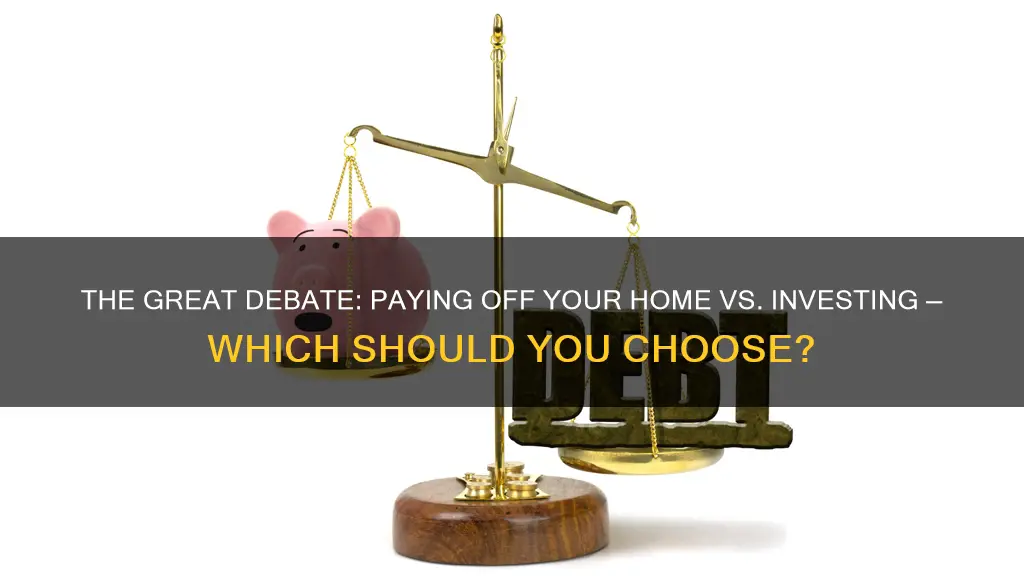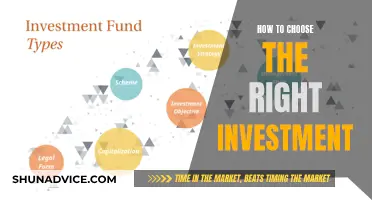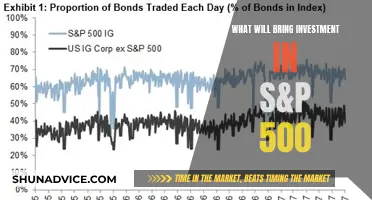
Paying off your mortgage or investing your money elsewhere is a common dilemma for homeowners. The right answer depends on your individual circumstances, including your financial situation, risk tolerance, and long-term goals. Here are some factors to consider when deciding whether to pay off your mortgage or invest:
- Financial situation: If you have extra cash, consider whether it's better to use it to reduce your mortgage debt or invest it to grow your wealth.
- Interest rates and market conditions: Compare the interest rate on your mortgage with the potential returns on investments. If you have a high-interest rate on your mortgage, it may be a priority to pay it off first. On the other hand, if you can get higher returns by investing, that might be a better option.
- Risk tolerance: Paying off your mortgage is generally considered a safer option as it's a guaranteed return on investment. Investing in the stock market or other financial instruments can offer higher returns but also carries higher risks.
- Retirement planning: If you're nearing retirement, paying off your mortgage can provide peace of mind and reduce your monthly expenses. However, investing in retirement accounts can also be a priority to ensure you have enough savings.
- Tax considerations: Consider the tax implications of both options. Paying off your mortgage early may affect your tax deductions and increase your taxable income.
- Other financial goals: Don't forget to consider your other financial goals, such as building an emergency fund or saving for retirement. Balancing your investments and debt repayment is essential.
| Characteristics | Values |
|---|---|
| Interest savings | Paying off your mortgage early can save you thousands or tens of thousands of dollars in interest payments. |
| Peace of mind | Paying off your mortgage early can ease your burden and prevent the possibility of losing your home to foreclosure in the case of a financial emergency. |
| Build equity | Paying off your mortgage faster means building equity in your home more quickly, which can help you qualify for refinancing. |
| Opportunity cost | Any extra money spent on paying down your mortgage faster is money that can't be used for other financial goals. |
| Wealth is tied up | Property is an illiquid asset, meaning you can't convert it to cash quickly or easily. |
| Loss of some tax breaks | Paying down your mortgage instead of maxing out your tax-advantaged retirement accounts means giving up those tax savings. |
| Higher returns | The average stock market return is higher than mortgage rates, so you stand to gain more from investing. |
| Liquid investment | Stocks, bonds, and other market investments can be easily sold and accessed. |
| Employer match | Investing extra funds in a retirement account may come with an employer match, giving you additional free money to enjoy compound earnings over time. |
| Higher risk | There is more volatility in the stock market than in the housing market, so you need to be sure your investing timeline is long enough to weather ups and downs. |
| Increased debt | Choosing to invest your money may not be the best option if you don't like the idea of having debt. |
What You'll Learn

Paying off your mortgage early vs investing: the math
Overview
The decision to pay off your mortgage early or invest depends on your financial situation, the loan's interest rate, and how close you are to retirement. From a purely financial perspective, investing typically offers higher returns than paying off low-interest debt. However, paying off your mortgage early provides guaranteed savings and the peace of mind of being debt-free.
Paying off your mortgage early
Paying off your mortgage early can provide significant interest savings, especially if done in the early years of the loan when most payments go towards interest. It also offers peace of mind, builds equity, and may provide tax benefits. However, it ties up your wealth in an illiquid asset and may result in opportunity costs by foregoing other financial goals.
Investing
Investing your extra cash instead of paying off your mortgage early can potentially provide higher returns, especially with the stock market's strong performance in recent years. Investing also offers liquidity and the potential for compound interest through employer-matched retirement accounts. However, investing carries higher risks due to market volatility and may increase your overall debt if investments underperform.
Example scenario
Let's consider an example to illustrate the math. Assume you have a 30-year mortgage of $200,000 with a fixed rate of 4.5%. Your monthly payments, excluding taxes and insurance, would be $1,013, and you'd pay a total of $164,813 in interest over the life of the loan.
Now, let's say you have an extra $300 per month. If you put this towards your mortgage, you'd save $67,816 in interest and shorten your repayment period by 11 years and one month.
Alternatively, you could invest that $300 per month in an index fund tracking the S&P 500, which has historically returned an average of 10%-11% annually. Assuming a more conservative average annual return of 8%, you'd have $160,780 at the end of 19 years (the time it would take to pay off your mortgage early). That's more than double your potential interest savings, and you'd still have about $55,293 left over after paying off your mortgage early.
In conclusion, the decision to pay off your mortgage early or invest depends on various factors, including your financial situation, risk tolerance, and investment goals. While paying off your mortgage early provides guaranteed savings and peace of mind, investing typically offers higher returns and liquidity. It's important to consider your priorities and seek professional advice before making a decision.
Delta Airlines: Invest Now?
You may want to see also

Pros and cons of paying off your mortgage early
Pros of paying off your mortgage early:
- Elimination of a big monthly payment: This is the most obvious benefit. Without a mortgage payment, you'll have more funds to use for other things.
- Interest savings: Paying off your mortgage early could bring significant savings by eliminating interest charges that would have been applied over the remaining months or years of your payment term. Depending on the loan amount, interest rate, and original term, paying your mortgage off early could result in significant savings.
- Predictable rate of return: The stock market, mutual funds, or other investment options can offer higher annual returns, but these returns fluctuate with the market. In contrast, paying off your mortgage early guarantees a predictable amount of savings each year, equal to your mortgage interest rate.
- Owning your home outright: The peace of mind that comes with owning your home and eliminating a sizable debt can be reason enough to pay off your mortgage early. Paying off your mortgage in full also gives you 100% equity in your home, allowing you to borrow a large sum using a home equity loan or home equity line of credit (HELOC) if needed.
Cons of paying off your mortgage early:
- Loss of mortgage interest tax deduction: If you itemize tax deductions, your mortgage interest payments likely offset your federal income taxes. Paying off the mortgage early would eliminate this benefit, so it's important to understand the tax consequences of eliminating your mortgage payments.
- Prepayment penalty: While not a common practice today, some older mortgage contracts charge a prepayment penalty if you pay off your mortgage early. Be sure to factor in this cost and ensure that the savings from avoided interest charges exceed any penalty you may have to pay.
- Neglecting savings: It's important to ensure that you're adequately funding your savings before focusing on paying off your mortgage. This includes setting aside an adequate household emergency fund and taking full advantage of any retirement savings plans, such as a 401(k) or individual retirement account (IRA).
- Opportunity for greater return: Investing in the stock market or other financial instruments may offer the potential for higher returns than the interest rate on your mortgage. For example, from 1992 to 2021, the average rate of return on investing in the stock market was 10.66% (or 8.10% when adjusted for inflation), while a current 30-year fixed-rate mortgage has an interest rate of around 6.5%.
Inheritance Dilemma: Invest or Pay Off Mortgage?
You may want to see also

Pros and cons of investing
Investing your money, rather than paying off your mortgage, has its pros and cons.
Pros of investing:
- Higher returns: The stock market has historically delivered higher returns than mortgage rates, so you stand to gain more from investing.
- Liquid investment: Stocks, bonds, and other market investments can be sold quickly and easily, giving you access to your money. In contrast, property is an illiquid asset, and it may take weeks or months to sell a house and convert it into cash.
- Employer match: If you invest in a retirement account and your employer offers a match, you can benefit from compound earnings on this additional free money.
- Tax advantages: Investing in a retirement account allows you to invest pre-tax dollars, which can help you afford larger contributions.
- Diversification: Investing in the stock market allows you to diversify your portfolio and reduce your investment risk. You can invest in different types of assets, sectors, and geographies.
Cons of investing:
- Higher risk: The stock market is more volatile than the housing market, and there is a risk of losing some or all of your investment.
- Increased debt: If you are uncomfortable with the idea of debt, investing may not be the best option as you will still have a mortgage to repay.
- Time and research: Investing in stocks requires time and effort to research and monitor your investments.
- Taxes: Profitable stock sales may be subject to capital gains taxes.
- Emotional rollercoaster: The stock market can be an emotional rollercoaster, and it can be challenging to avoid making impulsive decisions based on fear or greed.
- Competition: Institutional investors and professional traders have more time, knowledge, tools, and resources at their disposal, which can put individual investors at a disadvantage.
Ultimately, the decision to pay off your home or invest depends on various factors, including your financial circumstances, interest rates, and your proximity to retirement. It is recommended to consult a financial planner or advisor to help you analyse your personal situation and goals.
Mortgage or Market: Navigating Your Finances in a Recession
You may want to see also

The best of both worlds: refinance and invest
If you're unsure about whether to pay off your mortgage or invest, you don't necessarily have to choose. A two-pronged approach can help you reduce your debt and grow your wealth at the same time.
Mortgage rates are currently at historic lows, making it a great time to refinance. By refinancing to a lower interest rate and/or reducing your mortgage term length, you can save a significant amount of money. This is true whether or not you also choose to pay down the loan more aggressively. Just remember to factor in closing costs when running the numbers.
With the savings from refinancing, you can then invest in the stock market or other financial instruments. This allows you to benefit from the higher returns typically associated with these types of investments while still reducing your overall mortgage costs.
However, it's important to keep in mind that investing does carry more risk than paying off a mortgage early. The stock market can be volatile, and there is always the potential to lose money. Additionally, investing in retirement accounts or other long-term investments may require you to keep your money tied up for a significant period.
Therefore, when deciding whether to refinance and invest or pay off your mortgage early, consider your financial situation, risk tolerance, and investment goals. It may be helpful to consult a financial advisor to determine the best strategy for your specific circumstances.
Tesla: The Future of Electric Cars
You may want to see also

Factors to consider when deciding whether to invest or pay off a mortgage
There are several factors to consider when deciding whether to invest or pay off a mortgage. Here are some key points to keep in mind:
- Risk tolerance: Paying off a mortgage is generally considered a safer and more predictable option, as you know exactly how much you're saving. Investing, on the other hand, comes with varying levels of risk depending on the type of investment. The stock market, for example, can offer higher returns but also carries the risk of losses.
- Interest rates: Compare the interest rate on your mortgage to the potential returns on investments. If your mortgage rate is high, it may be more beneficial to focus on paying it off first. Conversely, if your mortgage rate is low, investing your money could potentially earn you higher returns.
- Retirement planning: Consider your retirement goals and how close you are to retirement. It's generally recommended to prioritize retirement savings, especially at a younger age, to take advantage of compound interest over a longer period.
- Financial circumstances: Assess your overall financial situation, including your income, expenses, and other debts. Ensure that paying off your mortgage early won't leave you financially strained or unable to cover unexpected expenses.
- Tax implications: Evaluate the tax benefits of both options. Mortgage interest is often tax-deductible, which could be a factor in your decision-making process. Additionally, investing in tax-advantaged retirement accounts can provide tax advantages.
- Investment opportunities: If you have a lump sum of money, consider diversifying your investments. Instead of putting all your extra cash into paying off your mortgage early, you could invest in stocks, bonds, or other types of investments to grow your wealth.
- Emergency fund: Build an emergency fund that can cover your living expenses for at least three to six months. This will provide a financial cushion in case of unexpected events such as job loss, medical emergencies, or other financial setbacks.
- Debt management: Evaluate your complete financial picture, including any other debts you may have. Focus on paying off high-interest debt, such as credit card balances, first to save on interest and maximize your investment potential.
- Peace of mind: Consider your emotional and psychological factors. Some people prefer the peace of mind that comes with being debt-free, while others are comfortable carrying debt if it means having more funds available for investments.
- Seek professional advice: Consult a financial advisor or a certified financial planner to help you make an informed decision based on your personal circumstances and goals.
Eth Investment: Right Move Now?
You may want to see also
Frequently asked questions
Paying off your mortgage early can save you thousands or tens of thousands of dollars in interest payments. It can also give you peace of mind and help you build equity in your home.
Any extra money spent on your mortgage is money that can't be used for other financial goals, like retirement savings or emergency funds. Property is also an illiquid asset, meaning you can't quickly convert it to cash if needed.
Investing typically offers higher returns than paying off your mortgage early. It also gives you more liquidity, as you can easily sell stocks, bonds, and other market investments if you need cash.
Investing comes with higher risk and volatility than paying off your mortgage. If you're not comfortable with the idea of debt, seeing your investments fluctuate can be stressful.
It depends on your financial situation, risk tolerance, and long-term goals. Consider factors such as your interest rate, investment returns, tax implications, and emergency savings. Consult a financial advisor to help you make the best decision for your circumstances.







